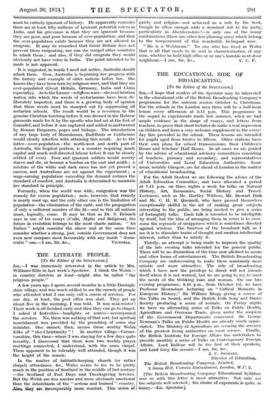'.1..11E LITERATE PEOPLE.
[To the Editor of the SPECTATOR.] was immensely interested in the article by Mrs. Williams-Ellis in last week's Spectator. I think the Welsh— ha country districts at least—might also be called "the religious people."
A few years ago I spent several months in a little Denbigh- shire village, and was much edified to see the crowds of people who attended what I can only call a course of services. For one day, at least, the post office was shut. They get up about five in the morning, I was told. It was mid-winter ! Their work is all finished early and then they can go to chapel. I asked if festivities—bunfights or soirees—accompanied the services. No, there was nothing of that sort, but spiritual nourishment was provided by the preaching of some star minister. One cannot, then, accuse those worthy Welsh folks of " rice-Christianity " ! In another village—Carnar- vonshire, this time—where I was staying for a few days quite recently. I discovered that there were two weekly prayer meetings connected, I understand, with the same chapel. These appeared to be tolerably well attended, though it was the height of the season.
In the matter of Sabbath-keeping, church (or rather chapel) attendance, &c., Wales seems to me to be pretty much in the position of Scotland in the middle of last century —the Scotland of Fast Days and Thanksgiving Services. But the Welsh are less sombre and more obviously emotional than the inhabitants of the "serious and learned" country. Akio, they are iaeomparably more musical. This union of gaiety and religion—not achieved as a rule by the Scot, though he often enough adds a mordant wit to his piety, particularly in Aberdeenshire !—is only one of the many combinations (there are other less pleasing ones) which belong to the temperament of this wonderful, bi-lingual race.
"He is a Welshman." To one who has lived in Wales that is all that needs to be said in characterization of any man, whether he hold high office or be one's humble next-door


































 Previous page
Previous page